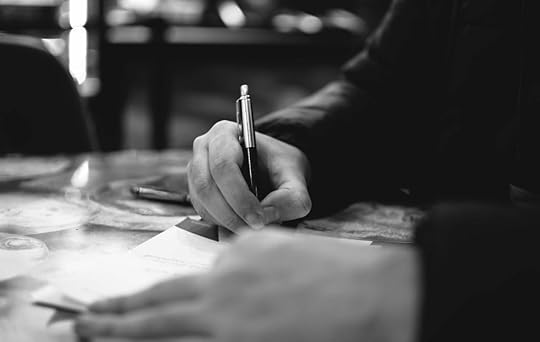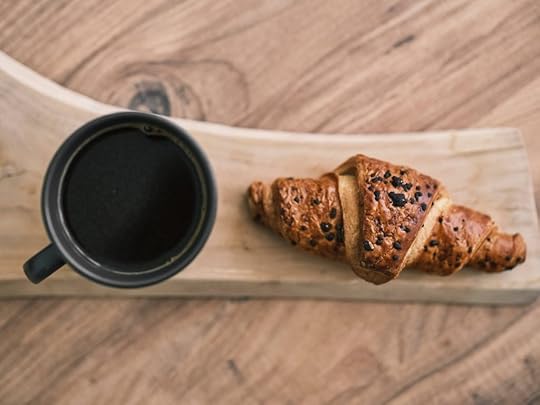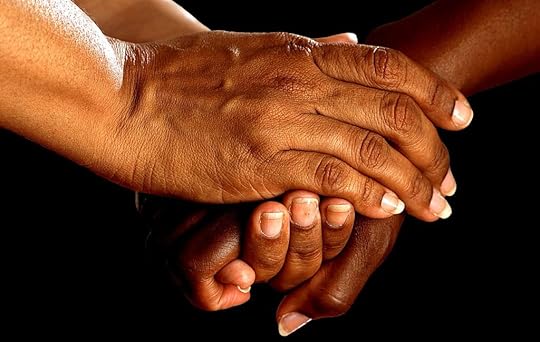Joshua Becker's Blog, page 37
March 12, 2022
Inspiring Simplicity. Weekend Reads.

My desire with each Weekend Reads is to provide you with articles and posts that encourage simplicity and minimalist living. Below, you will find links to blog posts and news stories that I hand-picked over the last couple weeks. I hope you find inspiration and practical help inside them.
But also, if you get a chance, share these posts with others via social media. With our efforts united, not only will each of us be inspired to own less and live more, but the life-giving message of minimalism will spread further and quicker, deeper and with greater effectiveness.
And that is my goal on Becoming Minimalist: to intentionally promote simplicity in a world that needs to hear it.
The Joy of Letting Go | Zen Habits by Leo Babauta. A surprising number of our daily struggles stem from our attachments.
8 Ways Minimalism Can Help Your Finances | The Balance by Miriam Caldwell. Embracing minimalism does not mean that you stop spending money, but it can mean that you spend it on other things and your focus may change from making money to enjoying life.
4 Overrated Buzzwords in Minimalism You Don’t Need to Embrace the Lifestyle | Medium by Melissa Frost. There are, however, more than enough guides and how-to’s in minimalism, and you can always add some popular buzzwords here and there. Some of these words I would categorize as overrated, and here’s why.
Reclaiming the Wonder of Ordinary Life | Rich in What Matters by Julia Ubbenga. It’s in the pauses, the slower moments, that we reclaim any sense of wonder in our lives.
Mum Overhauls Her Life by Clearing £35k Debt and Binning Most of Family’s Possessions | Mirror by Julia Banim. Along with her partner Robert, 34, the 29-year-old day-care owner completely reevaluated her family’s hoarding lifestyle, tossing out things they don’t use while limiting clothing to 14 items for each family member.
The Easy Way to Have More Time and Money | Becoming Minimalist on YouTube
March 10, 2022
The Empty Promise of Consumerism Summarized On One Receipt
A friend of mine recently returned some items to a large online retailer (no need to mention the store specifically—that’s not the point).
After the return, she showed me the receipt.
This is what it said:

“The perfect find is still out there. See you next time.”
In some ways, I can’t think of a better summary of the empty promises of consumerism.
Doesn’t that thought, arbitrarily printed by the retailer, display perfectly both the promise and subtle nature of consumerism promoted by our culture and advertising (even on return receipts)?
*The perfect find is still out there.
The message?
“There is a purchase out there, entirely perfect for you, that will fill the void in your life that you need to fill.
Whatever that need is, there is a purchase that can improve your life. The problem with this purchase isn’t that you are looking for another physical item to fill your needs… it’s that you purchased the wrong one.
Just because this purchase wasn’t perfect for you doesn’t mean the next one won’t be. You just need to keep looking.
So keep looking, keep buying, keep accumulating.”
*See you next time.
“You’ll be back. We know you’ll return. The trappings of consumerism are simply too difficult to overcome.
And even though you spent money on things you didn’t need last time you were here; something tells us you’ll be back soon enough to try it again.”
—
Messages encouraging consumerism surround us every day. Sometimes they are subtle, sometimes they are loud and in your face.
But the more we allow the empty promises of consumerism into our thinking and behaviors, the more common and accepted they become.
At some point, they need to be exposed. At some point, we need to take a stand against them personally and begin a movement of people rejecting those empty promises and looking for life elsewhere.
Let’s start with you and me. Our lives deserve better.
March 4, 2022
“Stuff” Hides the Most Important

Perhaps one of the most influential and defining moments of my journey into minimalism occurred while clearing my office desk of clutter.
It was a busy season at work and if I recall correctly, I had worked 40 hours over the course of one weekend.
On Monday, while taking a slower day in my office hoping to catch my breath, I began digging out my desk. Like many people, I have a tendency to get messy and disheveled during busy seasons. Papers and files had piled up haphazardly on my desk. So I set out to clear them off.
I cleared two stacks of paper quickly. But as I picked up a third pile, a note from my father slowly fluttered down from the bottom of the stack to the desktop below.
It was a handwritten note. Not a long one, but it communicated love and appreciation, potential and opportunity—one of those powerful messages that ground you in the person you are, but compels you to become more.
I had saved it, specifically, because it reminded me of my potential and motivated me to live for meaningful pursuits.
And yet, there it was, buried on my desk under a pile of comparably meaningless paperwork.
Buried so long, in fact, I had entirely forgotten it existed. Out of sight, out of mind as the old saying goes. The trivial and urgent had covered up the most important.
This small, simple discovery became a watershed moment in my pursuit of minimalism. It was a visual representation of an important truth: The meaningless, collected in excess, will always cover and crowd out the meaningful.
This discovery even prompted one of my most well-known quotes, “Maybe the life you want is buried under everything you own.”
Too often, this story defines our lives, not in pieces of paper, but in joy, value, and meaning. Every thing we own requires our time, money, and focus, calling for our attention. And for too many of us, our physical possessions have distracted us from things that matter in the long run.
This is the very basis of minimalism.
In fact, once you realize there are pursuits in life that result in far longer-lasting personal satisfaction than collecting physical possessions, you understand 100% of minimalism.
When my desk was sorted and cleared, that note returned to prominence in my life, attitude, and outlook. And once we begin owning less, life’s more important pursuits do the same.
February 28, 2022
10 Positive, Personal Traits Made Possible Through Minimalism

“Happiness resides not in possessions, and not in gold.” —Democritus
13 years ago, I was introduced to minimalism and immediately drawn to it.
At the time, the decision was based purely on a felt need: I was tired of all the cleaning and organizing required to care for our stuff. The more we owned, the more we cleaned.
I was also a bit tired of living paycheck-to-paycheck. But many of the financial benefits were revealed to me later.
Minimalism provided benefit in both areas for my family. Almost immediately, it freed us to spend less time and money chasing and accumulating material possessions.
But the benefits in my life have gone well beyond those felt needs. The outward journey has offered opportunity for inward change as well. It has allowed my heart to change and discover some positive traits I always desired.
Here are 10 positive, personal traits made possible through minimalism:
1) Contentment: being mentally or emotionally satisfied with things as they are.
Not all, but most of the discontent in our lives revolves around physical possessions and comparing our things to others. An intentional decision to live with less allows that discontent to slowly fade.
2) Generosity: willingness and liberality in giving away one’s money, time, etc.
When the mentality of always needing to own more is removed from our thinking, we are free to use our resources for other purposes. We are allowed (and have more opportunity) to redirect our energy, time, and money elsewhere.
3) Gratitude: a feeling of thankfulness or appreciation.
One of the most significant steps we can take towards experiencing gratitude in life is to focus less on the things we don’t have and more on the things we do. Minimalism makes that possible.
4) Self-Control: the ability to exercise restraint or control over one’s feelings, emotions, reactions, etc.
One of the most important character traits anyone can develop is self-control. And minimalism provides opportunity for it in greater degrees than ever before.
Minimalism forces us to take back control. It forces us to take back control of the things we own, the things we purchase, and the things we choose to pursue. Rejecting society’s notions of consumerism and happiness is an almost daily exercise in self-control.
5) Honesty: honorable in principles, intentions, and actions; upright and fair.
Not all, but many of the lies and mistruths that are told in our society are based on a desire to get ahead and possess more. Finding contentment with your things (even wanting less of them) reduces the need to be dishonest for financial gain.
Not every minimalist becomes more honest, for sure. But minimalism does make it more possible for those who desire it.
6) Appreciation: the act of estimating the qualities of things and giving them their proper value.
As we focus less on comparing our possessions to others, we can begin appreciating their accomplishment, their success, and the beauty that they bring to the world. Life becomes less about competition and more about encouragement.
We can fully appreciate others without being jealous of them (or worse, hoping for their downfall).
7) Self-Awareness: conscious knowledge of one’s own character, feelings, motives, and desires.
Many people go through life having no clear sense of their true values. Instead, desires are molded by culture and advertisements that bombard us each day.
Minimalism forces us to become more self-aware as it compels behavioral and psychological questions: Why is this hard for me to get rid of? Why did I buy all this stuff in the first place? Where did I get these ideas of happiness?
Learning about ourselves isn’t easy, but it’s always worth the effort.
8) Joy: the emotion evoked by well-being, success, or good fortune or by the prospect of possessing what one desires.
Minimalism removes the pursuit of happiness and joy from never-ending consumerism. Possessions promise joy, but never deliver in the long-term—which is why we always accumulate more.
I would never say that people automatically find joy when the pursuit of physical possessions is removed. But it certainly frees us to find it in things that matter.
9) Optimism: hopefulness and confidence about the future or the successful outcome of something.
“You’ll never change your life until you change something you do daily,” John Maxwell once said.
How about changing everything about your every day? How about changing how much of every day goes into cleaning and organizing? How about changing how much of your income goes toward buying things you don’t need?
That intentional change in behavior would offer opportunity to craft the life you desire going forward. And it provides optimism about what can be.
10) Self-Confidence: a feeling of trust in one’s abilities, qualities, and judgment.
Minimalism allows us to stop comparing ourselves to others. It allows us to celebrate our uniqueness, focus on the positives, and chart our own path forward.
Each of these actions, by themselves, would spark self-confidence. But taking all of them together almost guarantees it. Owning less requires us to stop living the life sold to us by culture every day. And forces us to gain confidence charting our own.
—
Now, please don’t misread me. I am not contending that all minimalists are automatically more honest, generous, or content.
I know many generous people who would not describe themselves as minimalist. And I’m sure there are some self-defined minimalists who chart obnoxiously high on the selfishness meter.
Also, I would never confess to have arrived fully in any of the categories listed above.
But I do believe that the intentional rejection of possessions does allow greater opportunity for each of these positive traits to emerge. What you do with that opportunity is up to you.
February 25, 2022
Inspiring Simplicity. Weekend Reads.

Fill your life with stories to tell, not stuff to show.
The simplicity/minimalism movement is a beautiful community. And I enjoy any opportunity to promote writing that encourages people to live more by owning less.
I invite you to fix yourself a nice warm cup of coffee or tea. Find a quiet moment this weekend. And enjoy some encouraging words to inspire more simplicity in your life today.
These 17 Rules for Simple Living Are the Best I’ve Ever Seen | Medium by Charlie Brown. Written by minimalists much smarter than me.
How to Make the Internet Small Again | Raptitude by David Cain. When you take a break from the activities you know are eroding your attention span—mostly phone and internet habits–you notice it improving after only a day or two.
Why Perfectionism Stops Us from Creating New Habits | Zen Habits by Leo Babauta. Our perfect idea of how our new habit will go is pretty much never how it actually goes.
The Cycle of Minimalism | No Sidebar by Emily McDermott. Our desire to acquire and consume is complex and is impacted by culture, among other factors.
A Guide to Getting Rid of Almost Everything | The New Yorker by Patricia Marx. Once you’ve thanked and said goodbye to the items that do not spark joy, what can you do with them?
10 Reasons to Watch Less Television | Joshua Becker on YouTube
February 24, 2022
The Compliment I Most Want Said at My Funeral

There are any number of compliments I would like said at my funeral, “He was faithful, humble, godly, kind, thoughtful, compassionate, generous… and the list could easily continue.”
But there is one compliment, maybe more than any of the others, I hope will be said of me:
He was the same person at home as he was in public.
In some regards, I can think of no higher praise to offer a person. It encompasses many of the adjectives above, but adds an added element: That was his true self—both in public when people were watching, and at home when no one was watching.
My grandfather passed away last December at the age of 99. He was a pastor to many his entire life. At his funeral, my mom offered these words, “I want you to know that my father was the same man at home as he was in public.”
It was her desire for everyone to know something they could never know. My grandfather was the same loving man when he got home in the evening as he was in front of the church on Sunday. He didn’t just pretend to be faithful, kind, and compassionate, that is who he was.
And I can think of no greater, more encompassing praise.
Consider this:
That compliment presupposes that you lived a life worthy of compliment.
That compliment communicates that you represented yourself honestly in public.
And it communicates that you remained true to your character throughout your entire life—to the very end.
Oh, I suppose it’s possible to try and hide your faults from your spouse and children, but there is only so much you can hide and only for so long. The life you live in secret will eventually be made known. And usually, unfortunately, it is your family who will see it first.
We work so hard to keep up our public image. And it is certainly possible to portray a fake life in the public eye. But when you get home at the end of the day, and spend time with the people you are around the most, your true colors begin to come through. How many celebrities have been exposed for their true self by the way they conduct themselves at home?
To be the same person at home as you publicly portray to others is a consistency not everyone achieves.
Ironically, it is at home, with the people we love the most that we should be at our very best. But that is, unfortunately, not always the case.
So how do we achieve this compliment?
It seems to me there is only one way: You live an exemplary life in both public and private, and you continue it until the very end.
Maybe that’s the reason it is the compliment I most want said at my funeral. It can only be achieved by becoming the person I want to be.
February 20, 2022
Sneak Peek at Things That Matter
I’m excited to release today a video trailer that I created to provide a little sneak peek into my new book, Things That Matter: Overcoming Distraction to Pursue a More Meaningful Life.
My goal was to create a preview video that would give everyone a snapshot into what the book is about, but also to create a video that is inspiring to watch—even without the book.
I hope I was able to accomplish that. You can watch it here:
Things That Matter: Overcoming Distraction to Pursue a More Meaningful Life will be available everywhere on April 19, 2022.
You can find even more detailed information about the book right here.
Or, click here to download and read the first chapter right now.
Also, I’m happy to answer any questions you have about the book, just leave them here in the comment section. Or, just stop in to say hello :)
February 17, 2022
The Simple Tool I Use to Overcome Procrastination

“Procrastination is a thief of time.” ― Charles Dickens
Procrastination is always a battle for me.
Of course, I’m not alone in my struggle. Studies report that 80%-95% of us struggle with procrastination at some point in our lives.
At its heart, procrastination is the act of unnecessarily postponing decisions or actions.
Fuschia Sirois sums up the problem best, “On its surface, procrastination is an irrational behavior. Why would somebody put something off to the last minute, and then they’re stressed out of their mind, and they end up doing a poor job or less than optimal job on it? And then they feel bad about it afterward, and it may even have implications for other people.”
And yet apparently, almost all of us struggle with it from time to time.
There are different reasons that we procrastinate, so a proper conversation would include different tools and ideas to help us overcome it.
In fact, here’s a short list of available ideas online:
Focus on your “why.” List out the costs of your procrastination. Reward yourself. Segment the task. Create a support system. Plan your day each dayThose are all good ideas—helpful for someone for sure. And if procrastination is sabotaging your life to a noticeable degree, I’d encourage you to read those articles above more in-depth. Many of them discuss procrastination on a deeper psychological level than I can.
But for me, I have found one simple tool to be more effective than any other in beating procrastination. Especially when I know it is keeping me from working on a task:
I call it “The 2-Minute Rule.”
Simply put, when I find myself procrastinating a big task, I tell myself, “I am just going to work on this project for two minutes.”
Then I stand up, walk over to the place where the project is waiting, and commit to two minutes of work.
I don’t set a timer on my phone or microwave to mark out the two minutes, but I do mentally commit myself to just two minutes of work. That’s all: just two minutes.
Many of the ideas online to overcome procrastination encourage “segmenting a task into smaller steps” and this is certainly a form of that idea. But the focus here is not on completing a task—however small it might be. The focus is on a specific time commitment of “two minutes,” which is mentally manageable no matter how much I dread the task.
For me, getting started is the greatest battle. And once I begin the task, I almost always end up spending more time than the two minutes—usually completing the entire task or a significant portion of it
In fact, I can’t think of a single example where I stopped after only two minutes. The mental exercise provided just the spark I needed to get started.
I’ve used this simple rule repeatedly at both work and home:
Writing an articleAnswering emailsEditing a bookCleaning the kitchenWorking outDoing yard workEven making a phone call I was dreadingNo doubt there are countless ideas to help overcome procrastination. If it is a chronic obstacle for you, I encourage you to read more about why it is happening.
But for starters, test out the 2-minute rule. It works for me every time.
At the very least, give it a try for 2 minutes.
February 14, 2022
Own Less Stuff. Solve More Problems in the World.

Once you realize there are pursuits in life that result in longer-lasting personal satisfaction than collecting physical possessions, you understand 100% of minimalism.
Minimalism is not just the realization that possessions don’t make us happy, it is based on the realization that possessions distract us from happiness. That everything we own requires money, time, focus, attention, and energy—and the more we own, the more distracted we become.
Our finite resources could be better spent elsewhere.
But where? Where should those freed-up resources be spent? Well, that is up to the individual and different people are going to answer that question differently. Some may desire to pursue travel, add to their bank account, or retire early.
But I don’t think any of us will ever regret working to solve problems that we see in the world. And owning less provides that opportunity.
Our money is only as valuable as what we choose to spend it on, and when we choose to use it confronting problems that exist in the world, the potential for our resources grows exponentially.
The reality is that problems exist all around us and there is no shortage of opportunities to make a positive difference in the world: from helping the struggling individual down the street to that crisis on the other side of the planet.
And no doubt we are passionate about different things (which is amazing and wonderful).
But there is one truth that unites us: we all want to make a positive difference in the world.
I am convinced that we all want to be generous. We want to help others and we want to solve problems when we see them.
The problem is, for many of us, we can’t seem to find the margin in our checkbook or calendar to do so.
Minimalism provides the margin.
It provides the opportunity to own less, buy less, care for less, and pursue less.
It frees up resources to help the single parent down the street, the co-worker struggling with medical bills, the local nonprofit serving your community, or that worldwide cause you are so passionate about.
The most significant difference we can make with our lives is to lean into our passion and solve problems where and when we see them.
Minimalism allows us to do that in ways we never dreamt possible.
Own less stuff. Solve more problems in the world instead. (tweet that)
February 11, 2022
Encouraging Simplicity. Weekend Reads.

Never underestimate the importance of removing stuff you don’t need.
Encouragement provides us with motivation to persevere. It invites us to dream dreams of significance for our lives. And it begs us to work diligently with optimism and promise.
Overcoming the pull of consumerism is a difficult challenge regardless of our stage in life. Simplicity requires encouragement. To that end, I hope you will find motivation in these articles below.
Each post was intentionally chosen to inspire simplicity in your life. For maximum effect, find a quiet moment this weekend and enjoy them with a fresh cup of coffee or tea.
A Better Way to Say No | The Art of Manliness by Brett & Kate McKay. Saying no feels awkward. It feels impolite. It makes you feel bad that maybe you’re not as nice or as helpful a person as you’d like to think, and it makes the asker feel bad that you’re somehow rejecting them personally.
How to Want Less | The Atlantic by Arthur C. Brooks. The secret to satisfaction has nothing to do with achievement, money, or stuff.
Decluttering & Self-Care: The Benefits of Letting Go | The Simplicity Habit by Julianna Poplin. Letting go of things may not sound like the most exciting form of self-care, but it’s one of the most important activities we can do to take care of our mental health in the long term.
1 Bold Move Creates Lasting Order | Prairie Garden by Liz and Eva. Orderliness: arranging myself and my surroundings to achieve greater efficiency.
All The Things I Want to Say About Money But Never Do | Joshua Becker on YouTube. Intentionally choosing to spend money on the things we truly want is not always easy.



